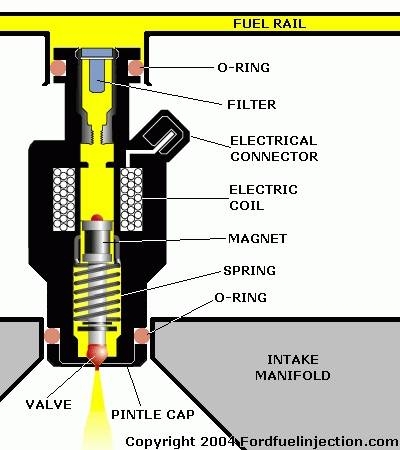
Cars made before the 1980s did not have fuel injectors. They had carburetors. These devices mixed air with fuel, delivering into the combustion chambers of the car's engine. However, they were unreliable, as sudden changes in air pressure would cause them to fail and require manual adjustment. Fuel injectors have since replaced carburetors. These are electrically controlled valves which regulate the timing and the amount of fuel passing into the car's combustion chambers.
A fuel injector works in conjunction with a high pressure pump, bringing fuel from the gas tank to pass in a continuous circuit over the intake of the injectors. From the intake, the fuel passes through a filter to ensure the valve beneath doesn't become clogged with sediment from the gas tank. The pressure of the fuel within the injector holds down the valve, preventing the gas from squirting into the combustion chamber. Suspended at the top of the valve is a small magnet above a spring. Outside the fuel filled injector is an electrical coil which surrounds the injector, raised about a half inch above the level of the magnet. As the electrical timing system of the engine decides that it's the right moment to put fuel into the combustion chamber below the fuel injector, it sends an electrical impulse to the coils. The magnet topping the valve is attracted to the electrical charge in the coils and raises the valve, unplugging the injector and causing the fuel to squirt into the chamber. With this done, the electrical charge is canceled and the spring pushes the valve back down into place, closing the injector until the next electrical signal is sent.
Very little, in truth. Many people complain of clogged fuel injectors after months or years of frequent use, and suggest you use a fuel cleaner to unclog the injectors. While the cleaner works, it doesn't clean the injector itself, as there's not normally anything wrong with it. The fuel filter at the top of the injector can become clogged over time, and it is these deposits which the cleaner dissolves. With only a spring and a valve to worry about, fuel injectors can go for decades without needing to be replaced; sometimes the return spring breaks after being used for years on end.